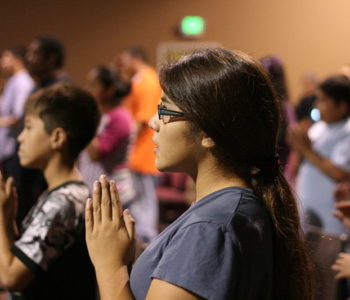
Richard Masoner
Until I was in the first grade, my conversations with God were primarily the bedtime variety, which began with the line, “Now I lay me down to sleep” and ended with a long line of “God blesses” that included every member of my family, my dolls and a few imaginary friends. We also said grace before each meal, but those were mainly improvised appeals for grace made up on the fly by my Baptist father. It didn’t occur to me that there were official church prayers for every occasion until I went to school and learned the prayer Jesus himself had supposedly written, The Our Father.
I can still see myself standing behind my desk with my hands folded, facing the crucifix while trying to make the Sign of the Cross for the very first time. I can still hear my teacher recite each line in turn so that we could repeat it back to her. The Our Father was beautiful, but it seemed long to me and I had no idea what half of the words meant. For the life of me I could not figure out why God was doing “art” in Heaven, why we were praying for Him to get His “will done,” (Didn’t he have an attorney up there?) why bread seemed to be the only food item on the menu and why were we so concerned with trespassing that it had to be mentioned twice?
Within a few weeks, I had the prayer committed to memory, but I quickly grew tired of it. Every morning I would deliver it, but my recitation lacked enthusiasm. In fact, I mumbled it under my breath in such a way that it sounded more like the hum of an old refrigerator than a prayer written by God Incarnate. I don’t know if my boredom stemmed from my lack of comprehension, the repetition, or if I merely missed my spur-of-the-moment intentions that made more sense to my young mind.
But about a decade ago, I attended a lecture in which a priest dissected the words of the Lord’s Prayer in such a way that it was as if I was hearing it for the first time. In one hour, those 55 words took on a whole new meaning for me. I suddenly understood what I’d been professing in a way I hadn’t before. I heard the poetry in the words. I recognized the irony hidden within the intentions and I recognized the difference between praying for what you need, and not merely what you want. From that day forward, I have never been weary of the Lord’s Prayer. I say it with humility and excitement knowing that if my heart is in the right place, it is the prayer that never fails. And hopefully, when the son of man returns, he will recognize my personal growth and find a faith within me that calls out to Him both day and night.
Today’s readings for Mass: 3 JN 5-8; PS 112:1-2,3-4, 5-6; LK 18:1-8
